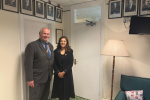
You will have heard a lot about the prime minister’s top five priorities for the year ahead. The first two priorities — halving inflation and growing the economy — are particularly important to my role as a minister in the Cabinet Office and Department for Business and Trade.
Economic progress can only be achieved if we work with businesses to deliver investment and opportunities nationwide.
The value of public and private sector co-operation is one of the reasons why I regularly meet business leaders across the United Kingdom, from international corporations to family firms. These meetings are vital opportunities for me to speak with the people who make real-world decisions about our economy: whether to invest in new technology, create new positions or open newpremises. I get to hear directly about the challenges business leaders face and what they think we can do to help.
All of the businesses I engage with, no matter their size or sector, have similar expectations for government. They ask that we ensure regulatory processes are open and transparent. They ask that we act consistently, providing a predictable environment for future investment. They ask that when we introduce new legislation, we continue to engage with businesses long after royal assent has been granted.
Alongside the deputy prime minister, I have responsibility for the Investment Security Unit, which oversees the National Security and Investment Act 2021. The government introduced the act to help identify and manage national security risks that can result from business acquisitions. The vast majority of businesses will never need to engage with the legislation. But for those who do, the government is committed to making the process business-friendly and pro-investment.
New data published this week suggests we are fulfilling this commitment. In 2022-23, the government received 866 notifications and called in just 65 acquisitions for review. We cleared more than 90 per cent of the notifications we reviewed within 30 days, allowing businesses to get on with investment and growth. We also met all of our statutory deadlines, providing businesses with the clarity they need to plan ahead.
Yet when we identified risks to national security, we were not afraid to act. During that period, the government intervened on 15 occasions to block, unwind or impose conditions on acquisitions, using tools called “final orders”. These interventions focused on acquisitions in particularly sensitive sectors, such as defence, communications or energy.
In the year ahead, I am determined to build on our track record. During the passage of the National Security and Investment Act, the government committed to periodically publish market guidance to provide practical support for businesses engaging with the legislation. We published the first edition of this guidance last year. Since then, we have continued to engage with investors, businesses and their advisers to gather feedback about their experiences. These insights informed the second edition of market guidance, which we published in April.
This fresh guidance provides further clarity about how businesses can make effective representations to the government and outlines additional information about timings, including when businesses should notify that acquisitions are being contemplated.
While it is now more than two full years since the National Security and Investment Act received royal assent, our commitment to implement the rules transparently and predictably remains true. Through continued co-operation, I am determined that we can build regulatory frameworks to protect national security while allowing the investment needed to deliver the prime minister’s five priorities.
Nusrat Ghani is minister of state for industry in the Department for Business and Trade and the Cabinet Office
The original article is available here.

